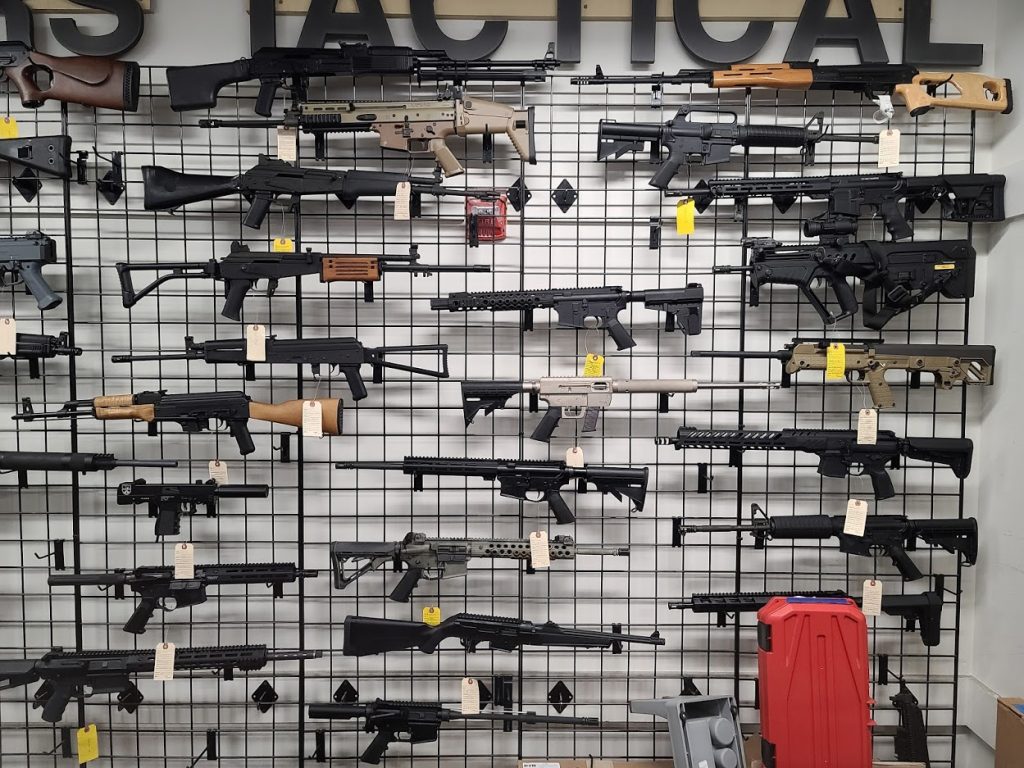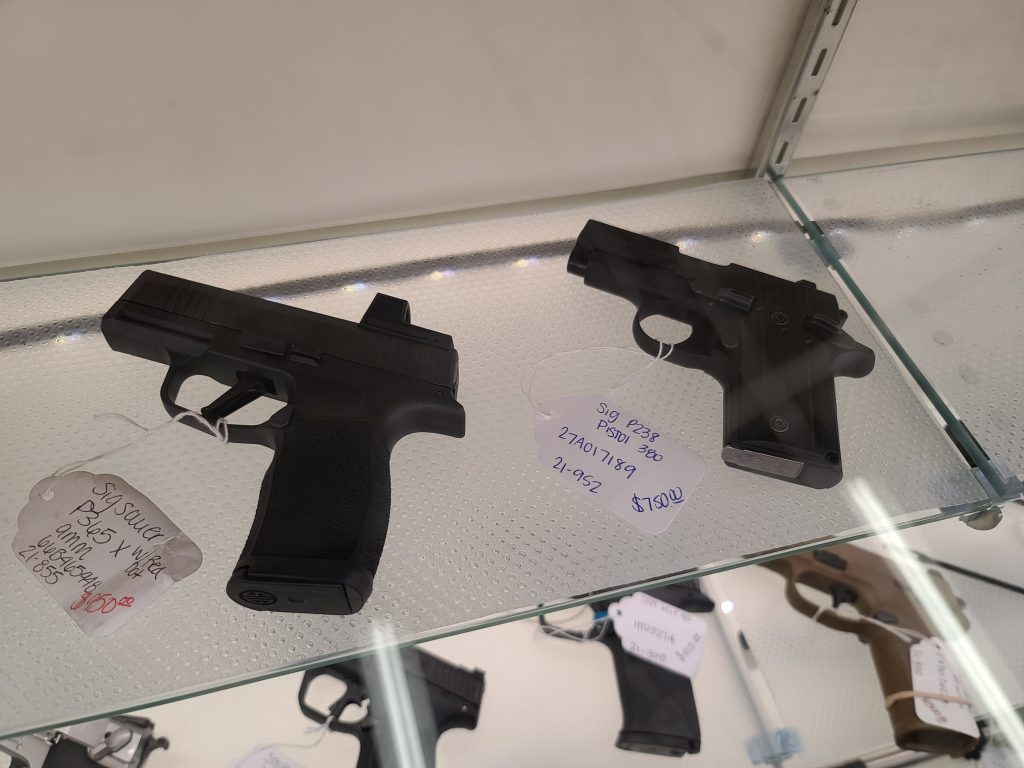The beginning of the year is a great time to both look back at what we just lived through and look forward to where things are headed.
So, in this edition of the newsletter, we’re doing exactly that. Contributing Writer Jake Fogleman starts us off with a look at the impending fight over state preemption laws. And I finish things off by examining last year’s gun sales and take a stab at predicting what they mean for the future.
In between those two pieces, I talk with Canadian gun-rights lawyer Ian Runkle about the country’s fast-approaching deadline to turn in AR-15s. He explains why so few people have turned them in thus far and what’s coming for our neighbors to the north.
SHOT Show
SHOT Show, the gun industry’s trade show, is coming up in Las Vegas next weekend. Jake and I will be there in person to cover it. Big names like Ruger, Berretta, and Sig have decided not to attend because of the latest surge in covid cases. However, NSSF has said the show will still go on as planned. CES was held in the same venue this week and while attendance was down there were still quite a number of people there.
If you’re going to be at SHOT, reply to this email and let me know. Maybe we can do a fun (and safe) meet-up of some sort. I’d love to meet some of you in person!

Analysis: The New Frontier in State Preemption Fights [Member Exclusive]
By Jake Fogleman
After decades of stalemate at the federal government level, the debate over gun laws has shifted increasingly to the local level. As a result, state preemption laws and attempts to circumvent them have become all the more relevant.
As a response, two divergent and novel approaches to the issue of preemption have emerged in recent months. They could set a pattern for other states on either side of the issue to follow.
Colorado is an example of the first approach. In the 2021 legislative session, it became the first state with a firearm preemption law to repeal it. Since then, the city of Denver has been able to pass a ‘ghost gun’ ban and there’s now talk of the city of Boulder—the city that led the charge for the preemption repeal in the first place—reinstating its assault weapons ban and magazine capacity ban, among other moves.
Other states with secure Democratic majorities could choose to follow the Colorado blueprint in repealing firearm preemption now that it is no longer an unprecedented move. That would open the door for more local gun control with less legal recourse for gun-rights activists to push back.
The other approach, taken by states with more gun-friendly legislative majorities, has been to introduce legislation bolstering preemption laws with civil penalties for local governments who violate the law by passing restrictive local ordinances. Think of it as a preemption statute with teeth.
Bills of this nature are currently working their way through the legislatures of both Pennsylvania and New Hampshire.
In New Hampshire, House Bill 307 would change the state’s preemption law by allowing any New Hampshire resident who is affected by a local ordinance restricting firearms, accessories, ammunition, or knives to bring a civil action against the local government that passed the ordinance. They would be entitled to a civil award, as well as have their court costs covered, if the legal challenge is successful.
The bill passed the state Senate on Wednesday, and currently awaits a vote in the state House. A different version of the bill has already passed in the House, but each body needs to pass the same language before it gets sent to the governor.
The Pennsylvania bill, House Bill 979, would give legal standing to any Pennsylvanian affected by a local ordinance passed in contravention of the state’s preemption law. This would allow them to challenge the ordinances in court whether or not they have been charged under the new law. The bill would essentially codify into law what the Pennsylvania Supreme Court has already ruled in an October case challenging the local gun-control ordinances in the capital city of Harrisburg.
The bill would also allow citizens who successfully challenge local gun ordinances to collect damages and recoup court costs for their efforts.
Pennsylvania, perhaps more than any other state, has seen high-profile fights over state preemption throughout the years. Major cities like Philadelphia, Pittsburgh, and Harrisburg routinely attempt to pass restrictive gun laws despite the existence of a long-standing preemption statute. Even though the laws are regularly struck down in Pennsylvania courts, the cities continue to fight for ways to pass local regulations.
Versions of the bill have passed in both the Pennsylvania Senate and House, but, with Democrat Tom Wolf currently occupying the Governor’s office, it won’t have a shot of becoming law before the next election. Momentum for such a law to continue in future legislative sessions.
We are still in the early stages of this development. However, with local efforts to regulate guns becoming increasingly common, expect advocates on either side of the issue to continue finding creative ways to achieve their goals moving forward.
Podcast: Canadian Gun-Rights Lawyer Ian Runkle on AR-15 Confiscation Effort [Member Early Access]
By Stephen Gutowski
One of the persistent debates in American gun politics is over AR-15s and other “assault weapons.” Policy around ARs has stagnated since the federal assault weapons ban expired in 2004. However, gun-control advocates have begun to expand proposals into outright confiscation, with Beto O’Rourke being among the most prominent.
Now, our neighbors to the north are testing out these expanded proposals in practice. It isn’t going well so far. Program costs have already run over budget for the buyback portion of the mandatory buyback and details for it haven’t even been announced yet despite a looming April deadline to turn in the affected guns.
As a result, very few Canadian gun owners have actually turned in their ARs a year and a half after the ban was announced.
To get a better idea of what’s at play with the confiscation effort and how it’s likely to play out going forward, I had Ian Runkle on the podcast to give us his perspective as both somebody affected by the ban and an expert on Canadian gun law. Ian is a Candian gun-rights lawyer who has litigated many cases involving the country’s complex gun laws. He also owns AR-15s.
We talk at length about how the government has effectively incentivized people not to turn in their guns to this point and how he expects they may go about enforcing the confiscation order once it does go into effect. We also discuss the differences between gun culture in the United States and former commonwealth countries such as New Zealand and Australia. Ian weighs in on whether Canadians are more likely to resist the confiscation effort than their commonwealth cousins due to their proximity to their more rebellious American neighbors.
Ian explains how the national registry of AR-15s and other targeted guns in Canada will make resistance difficult for many. But, he says he expects the guns on the ban list which aren’t registered will see a far lower compliance rate. He said that’s especially true for a number of guns that people may not even realize are banned under the order given its vague wording.
We also discuss the impact the policy is likely to have on Native Canadians and how it mirrors the disparate impact of gun law enforcement in the United States.
Plus, Contributing Writer Jake Fogleman details how permitless carry just got a big boost in Georgia thanks to the impending gubernatorial election. And we look at how many millions of guns were sold in the United States during 2021.
You can listen to the show on your favorite podcasting app or by clicking here.
You can also watch the full episode on our YouTube channel.

Analysis: What Does the 4th Quarter Decline Mean for Gun Sales in 2022? [Member Exclusive]
By Stephen Gutowski
Gun sales slipped a bit at the end of 2021.
While the total sales numbers for the year–as measured by the number of gun-related FBI background checks–were strong, the fourth quarter and December numbers were less than stellar. 2021 was the second-best year on record for gun sales. But December 2021 was only the fifth-best December on record, and the same is true for the fourth quarter.
The downturn comes despite there being some reason to believe the end of 2021 might actually surpass 2020. Certainly, 2020 was an unprecedented year–as every ad told us over and over again–with a unique set of chaotic factors that contributed to the all-time demand. However, most of that demand was concentrated in the first half of the year. Plus, the March and June sales spikes dried up much of the industry’s supply.
So, it seemed that late 2020’s gun sales might have been suppressed. And, therefore, late 2021 had a chance to overtake it. Black Friday 2021 outsold 2020, and it seemed to be a sign the fourth quarter might do the same.
But, instead, it appears the pent-up demand was already satisfied in the first half of 2021. The early months of the year were when 2021 outpaced 2020. January, February, and April set all-time records before the pace fell back to the second-best-ever rate.
Supply didn’t return to normal by early 2021 and prices remained elevated to compensate, especially in the ammo market. However, the industry managed to ramp up production quickly enough to satisfy anybody who couldn’t buy the gun they wanted in 2020.
Then demand had to be sustained by the events of 2021 instead of 2020. And, the most significant motivating factors had moderated by then. Though, they didn’t entirely dissipate.
The pandemic dragged on, but Americans got more used to living in it–as used to it as you can at least–and the initial shock of that accompanied the onset of a 100-year contagion has worn off. Racial tensions, controversy over-policing, and the threat of rioting remain, but–again–they aren’t anywhere near the level seen in the summer of 2020.
Even the political factors aren’t as stark as they were in 2020. While President Joe Biden (D.) remains as committed as ever to instituting new gun restrictions and sales bans, the chances of passing new gun laws through Congress all but evaporated by the fourth quarter of 2021. And, though he has pursued executive actions, he wasn’t even able to get his preferred ATF nominee confirmed despite Democratic control of the Senate.
So, what does the decline mean?
I think the main question is whether the industry will be able to predict the post-pandemic market better than it did the post-Sandy Hook market. In 2013, the industry saw an incredible spike in demand for AR-15s after the massacre provoked the possibility that Congress might re-institute the “assault weapons” ban. ARs were being sold for two or even three times their normal price at the peak.
That led to many manufacturers ramping up production in a huge way. However, when federal gun-control measures faltered, the market was left with a glut of ARs. Prices collapsed, and so did several smaller manufacturers.
Will something similar happen now?
2021 was a strong year. It was the second-best ever for gun sales. Publicly-traded gun makers saw huge profit increases because of that.
But, now we see the first signs demand may actually fall a bit further. Next year could further depress demand. The pandemic has been unpredictable, but there is some reason to believe the Omicron wave could see the decoupling of cases with hospitalizations and death. That’s what we’ve been working towards since the very earliest days of March 2020. Maybe 2022 will restore public confidence the pandemic is truly over, and a more stable, less chaotic future is ahead.
Plus, national politics will likely make the odds of new gun legislation even longer. President Biden’s polling has been atrocious ever since the botched Afghanistan pull out and has only gotten worse. His party is already working against historical momentum in the midterms, and Republicans will probably recapture control of the House, perhaps the Senate too.
Of course, President Biden’s antagonistic approach to gun owners will likely continue to be a strong driver of gun sales. He’s unlikely to get the significant legislative reforms he wants, especially if Republicans do take at least one house of Congress. However, the executive actions he’s already pursuing will effectively outlaw millions of guns and lead to years of high-profile legal fights.
Plus, there is a lot of data that suggests an unusual number of new gun owners have been brought into the market over the past two years. A significant percentage of them will probably embrace gun ownership as a new hobby and begin buying more guns in the process. That’s why sales often level off somewhere higher than before the surge, and history is likely to repeat itself this time around too.
The big question left to be answered is exactly where the leveling off stops in 2022.
That’s it for now.
Oh, by the way, I’ve been playing a lot of Halo Infinite lately. If you want to party up, send me a friend request. My gamertag is SG1242.
I’ll talk to you all again soon.
Thanks,
Stephen Gutowski
Founder
The Reload






